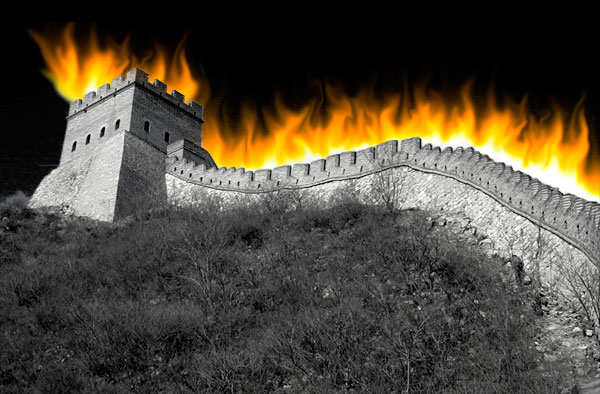The World Internet Conference (WIC) is taking place this week in Wuzhen, a small canal town in eastern China. Participants, who include world Internet giants such as Apple and Facebook, have been treated to free and open Internet access at the conference location. Edmond Lococo reports on this temporary and limited loosening of the grip on the Great Firewall for Bloomberg:
[…] This temporary opening of the gates doesn’t mean China is having second thoughts about Web censorship. Not in the least. China often lifts its controls on the Web for attendees of high-profile international forums, as it did for the Asia-Pacific Economic Cooperation meeting in Beijing earlier this month. The Internet service in the media center at APEC allowed access to nationally banned sites, such as Facebook and Twitter.
[…] China is hosting the summit in Wuzhen to “give a panoramic view for the first time of the concept of the development of China’s Internet and its achievements,” according to Lu Wei, the minister of the country’s new Cyberspace Administration, the regulator that’s staging the event. [Source]
The WIC in Wuzhen was controversial before it started. Unsurprisingly, openness was left out of the official rhetoric, which focused instead on China’s unique management of the Internet. As James T. Areddy reports for the Wall Street Journal:
[…] In a sign of its confidence in the Great Firewall, when China celebrated its 20th year online in April, Xinhua News Agency declared that “behind China’s Internet boom is Beijing’s unique way of management.”
China has positioned the conference as a showcase to celebrate that management of the Internet, with a setting that reflects Zhejiang province’s Web success stories as much as the Ming and Qing architecture that inspired writer Mao Dun. The most notable business success is located down the road in Hangzhou—Alibaba Group, which in September raised $25 billion in an initial public offering that illustrated the value in China’s Internet user base of more than 630 million.
[…] Internet security is high on the agenda for the gathering, which has attracted top officers of Chinese powerhouses like Tencent Holdings, Baidu and Qihoo 360 Technology . Others in attendance include policymakers like Fang Binxing, the man credited with creating the controls behind the Great Firewall, and a small number of foreign Internet companies. [Source]
Read more about Internet censorship in China via CDT.








